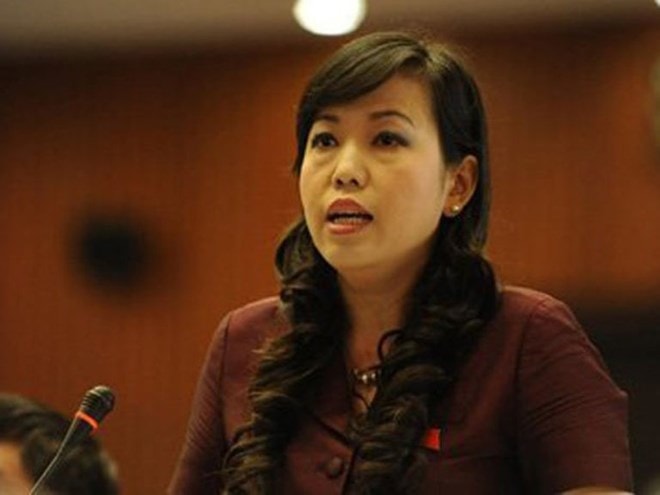Civil Status Bill: There needs to be a principle prohibiting giving children bad names
Discussing the draft Law on Civil Status in the hall on the morning of October 28, most of the National Assembly deputies agreed that the issuance of birth certificates to children should continue.
Presenting a report explaining, accepting and revising the draft Law on Civil Status, Chairman of the National Assembly's Law Committee Phan Trung Ly said that there are currently two opinions on whether to abolish or keep issuing birth certificates for children.
The first opinion wants to keep the birth certificate issuance as it is currently, and the second opinion wants to abolish the above registration and instead issue identity cards to children right from birth.
The National Assembly Standing Committee assessed that birth registration is the State's recognition of a person's birth right from birth. Therefore, the National Assembly Standing Committee proposed to continue issuing birth certificates to children.
Giving his opinion on whether to abolish or keep issuing birth certificates for children, Deputy Nguyen Thanh Hai (Hoa Binh) cited a specific case at Bo De Pagoda recently.
 |
| National Assembly Delegate Nguyen Thanh Hai: "In the Bo De Pagoda case, who is responsible for the 80 children not having their birth certificates registered?" |
Delegate Hai emphasized that although the temple takes in and raises abandoned children, it has not yet met the material conditions or legal procedures for the children.
Specifically, at the time of inspection at Bo De Pagoda, out of 112 children being cared for, 80 children had not been registered for birth and had not had their basic rights recognized.
This has directly affected children's right to adopt, their right to be adopted and violated children's rights according to the United Nations international convention.
Although the local authorities actively resolved the matter upon discovering the incident, Deputy Nguyen Thanh Hai asked: "Which agency or individual will be responsible for the 80 children who did not have birth certificates?"
She continued: The State management responsibility for issuing birth certificates to abandoned children... regulations are still very general. There are actual violations but it is difficult to point out who is responsible, who must compensate, and what the specific compensation level is.
The Draft Law on Civil Status has a large scope of regulation and an important position in relation to human rights, so it is necessary to add more detailed and specific regulations on the responsibility of birth registration for abandoned and disadvantaged children.
Delegate Ho Thi Thuy (Vinh Phuc) said that issuing birth certificates to children is necessary, in accordance with the international convention on children's rights, the Civil Code and the Law on Child Protection, Care and Education. A birth certificate is the first legal document issued by the State to recognize citizenship rights. This is also the basis for issuing citizen identification cards to people under 14 years old and for issuing other legal documents.
“When dealing with foreign representative agencies in Vietnam, they still require the presentation of birth certificates. If we stop issuing birth certificates and require the registration of household registration extracts when registering births for the declarant, we cannot eliminate administrative procedures,” said Deputy Thuy.
According to Deputy Huynh Van Kinh (Tien Giang), the right to birth registration is an individual civil right guaranteed by the State. Children's right to birth registration and civil status is one of the important contents of the international convention on the rights of the child, Vietnam is the second country in the world to sign this convention.
Birth certificates are valid for life, have no expiration date, and do not need to be changed like citizen identification cards. Issuing citizen identification cards to children under 14 years old is wasteful and costly for citizens. Furthermore, when citizens turn 14, they must change to another card.
Also agreeing with the issuance of birth certificates for children, Deputy Nguyen Van Tam (Kon Tum province) emphasized that, in terms of the nature of the provisions in the law, birth certificates and identity cards are completely different. If birth certificates are the basis for other documents in State management, then citizen identity cards only serve the State management of citizens.
"The citizen identification card cannot replace the birth certificate" - Delegate Tam concluded.
Referring to the issue of the draft Law not setting out principles for naming children, which is making it "difficult" for local civil status officials, Deputy Nguyen Thi Nhung (Khanh Hoa) stated that in reality, officials at the grassroots level will be powerless to convince parents to give their children pure Vietnamese names.
For example, giving a child a bad name like: Dinh Sau Rum, Cao Ki A, a bad name, an unaesthetic name that causes inferiority complex like Le Van Han, Nguyen Van Li; a name that is too long causes complications like Le Hoang Hieu Nghia De Nhat Tam Nhan. This is a very long Vietnamese name that causes difficulties when doing procedures.
Ms. Nhung proposed that there should be principles for naming and determining surnames in accordance with long-standing customs and practices. Avoid situations where, due to the wishes of parents, the child's surname and ethnicity do not conform to customs and practices. For example, parents are of the Dak Klay ethnic group but give their child the surname Nguyen, resulting in a new surname that requires correction of the household registration.
According to Infonet






